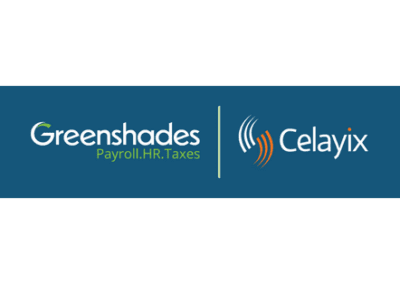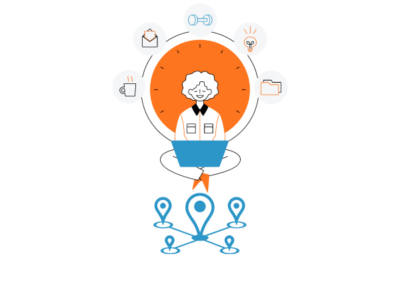In the business world, AI (artificial intelligence) is known for its profound potential to optimize business activities. According to Grand View Research, the global AI market size was worth $62 billion in 2020, and is expected to have an annual growth rate of 40.2% from 2021 to 2028, At Celayix, we’ve long known that the use of AI has enormous potential for software. In fact, we’ve been using artificial intelligence in our scheduling software for quite some time now!
We’ve all heard of Chat GPT and other AI tools which have become day to day tools we use and love. But have you ever considered that Artificial Intelligence is incredibly valuable for workforce management and employee scheduling?
How does AI Work?
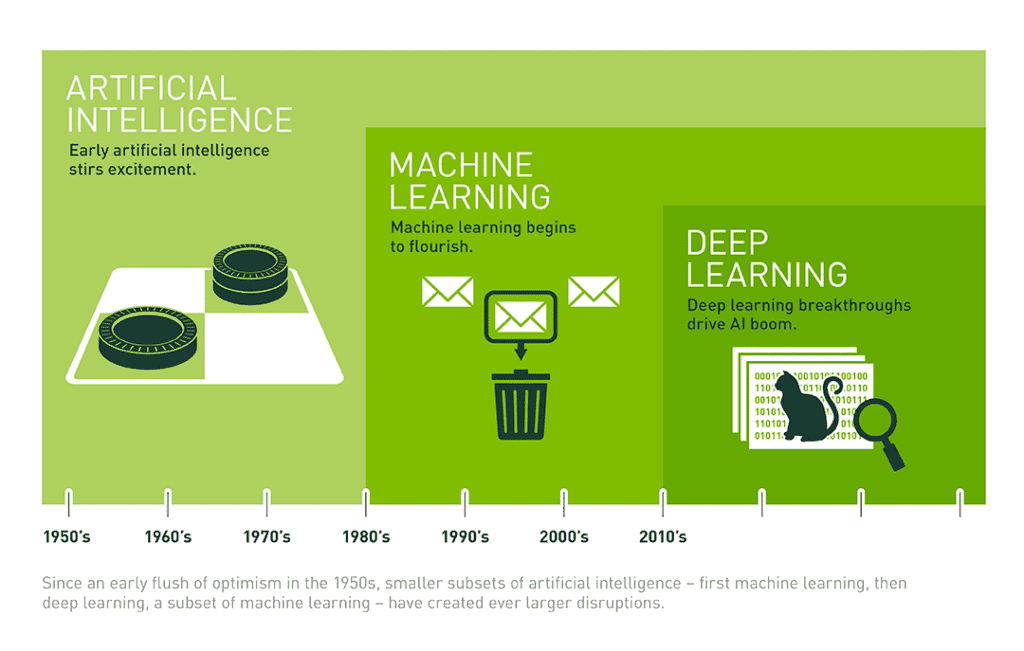
Software with AI functionality has a wide range of benefits for you, as a scheduler or manager, and your organization. With AI-driven employee scheduling software, for example, you can automatically create fair and balanced schedules, every time. AI achieves this using historical data that is collected through machine learning. In more recent years, we have seen AI use deep learning to process image, video, text and audio data.
Machine learning is the concept of algorithms and statistical models used by computers to perform tasks without explicit instructions. Instead, it relies on patterns and inference. Machine learning algorithms build a mathematical model based on data. It then uses this data to make predictions or decisions without being explicitly programmed to perform the task.
For example, with artificial intelligence in scheduling, AI will learn from a scheduler’s behaviour patterns. It will then analyze them and reach an evidence-based conclusion to create the schedule.
The important aspect here is the utilization of data. With scheduling software, AI functionality can analyze the historical data it’s been collecting since its implementation. Then, it uses this data to produce insights and efficiencies in the scheduling process.
AI Thrives on Complexity
Every business has its standard practices, and as a result, every schedule has its own complexities and intricacies. When it comes to setting schedules, there is a multitude of different factors in play. Employee experience, seniority, availability, certification, and the total number of hours are just a handful of them.
Unsurprisingly, every business wants to minimize overtime hours, while still ensuring the best employees are working. AI can take these factors into account while, notably, following business rules and applicable laws.
Business owners want scheduling efficiencies, but they also want to make sure they can trust their software. To protect sensitive business data when accessing scheduling software remotely, using a VPN for Mac or Windows devices can add an extra layer of security. AI ensures that schedules follow all pre-determined business guidelines. AI will learn from your decision-making and optimize the schedule based on historical data.
For example, if an employee shows a record of working shifts relating to a particular client, it may mean they are very suitable for that client. AI can discern this trend and include this in the scheduling process by suggesting this employee for any shifts related to that client.
Applications of AI in the Workplace
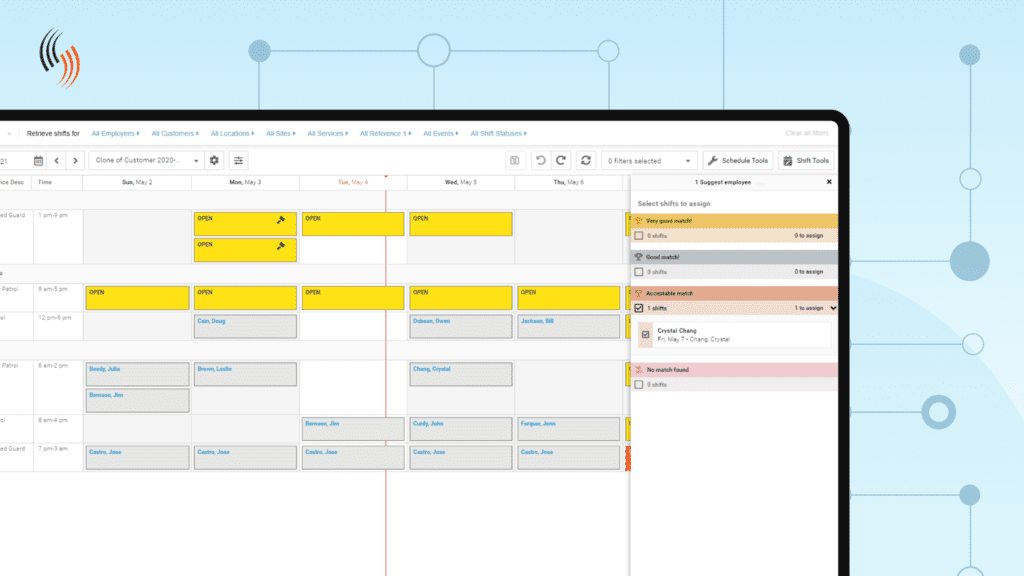
Workplaces use Artificial Intelligence for many purposes. It is seen in marketing, research, customer experience, recruiting, and of course, employee scheduling. While you might wonder how artificial intelligence can improve these processes, one common theme across all applications is that it improves productivity.
Businesses use Artificial Intelligence to identify patterns and trends within data. You can imagine how helpful this is in identifying valuable sales leads or highlighting peak demand and predicting consumer behaviour. In addition, we see executives use it to identify valuable information from large data sets, helping them make critical decisions driven by data.
In the past, this analysis might have taken a considerable time, but artificial intelligence speeds up the process while also choosing the best data. Artificial intelligence’s automation also provides far more value to customers and employees than we’ve ever seen before. From chatbots to menial tasks, AI can save time and provide genuine happiness to all stakeholders in your business.
Manual scheduling is time-consuming and inefficient:
The assignments provided to a scheduler are often tricky and complicated. Each employee itself is an assignment. Creating a schedule for a mobile workforce requires high levels of communication and coordination. It’s unlikely that a company sees no hiccups in their schedule, often because schedulers cannot create a schedule that perfectly fits every employee. Such a task for any employer is not just challenging but time-consuming and inefficient too. The number of people that require coordination to make manual schedules makes scheduling problematic. A lot of time and energy is wasted on an operation that businesses hope to complete immediately.
Manual scheduling is prone to error:
It’s a common understanding that any task as tedious as manual scheduling is prone to errors. After all, our flaws are what make us human. Nevertheless, these errors are still very costly for any business. Poor scheduling is often a result of such errors, and they often add to various labour costs such as overtime costs. Such errors are often the reason behind overstaffed and understaffed workplaces. As mentioned before, it’s unlikely that schedulers have no hiccups; they’re often filled with double bookings & missed shifts. As a result, manual scheduling has a greater chance of having more no-shows and overtime than an AI-based scheduling platform.
Creating biased, unfair schedules:
This might not be the most common scheduling issue, but it has significant consequences. As per a study by the University of Washington, there is a managerial bias toward flexible scheduling. Managers prefer or prioritize employees who work early hours over those who work later. This bias is worse in companies where flexible scheduling still isn’t an option. Consequently, manual scheduling might lead to certain biases where some employees are preferred and judged higher than others based on something other than performance.
Benefits of Artificial Intelligence in Employee Scheduling
Here at Celayix, our mission is to make employee scheduling easy. That mission is at the core of every scheduling feature we add to our software, and AI is no different. Aside from making scheduling easy, AI has a range of other benefits when it comes to scheduling too.
The best part of AI-powered scheduling is that it doesn’t replace the schedulers but makes them better decision-makers.
TIME & RESOURCE MANAGEMENT:
As mentioned earlier, scheduling is a component of efficient management, but it should not be the main focus of the management team. Every company has some more productive tasks and goals that require the company’s time and resources. AI, which thrives on complexity, discovers new standards from historical data using machine learning and recommends the best shift assignments.
The best part of artificial intelligence in scheduling is that it doesn’t replace the schedulers but makes them better decision-makers. As a result, managers can now spend time on other tasks within the business and spend less time finding a replacement for any shifts.
REMOVE ERRORS & IMPROVE SCHEDULE QUALITY:
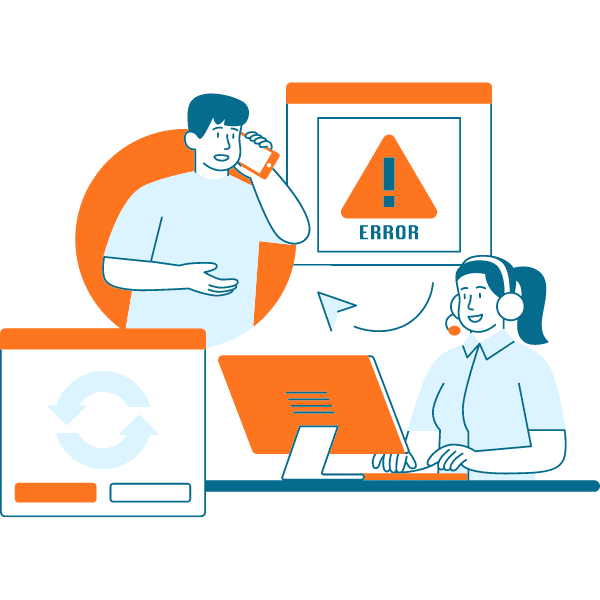
AI scheduling systems have scheduling and workforce management capabilities that even the best human experts might not be able to compete with. The scope for AI is limitless. AI can review the schedules for any errors and further improve scheduling quality by suggesting best-fit employees for any shift.
All it requires is the historical scheduling data of the company. AI feeds on this data to factor out availability, qualifications, and client’s needs to develop the best-recommended and most efficient schedule. Oh, and did we mention it works in real time?
MANAGE AND UTILIZE SCHEDULING DATA:
You must wonder how large a dataset an AI scheduling system works with! Well, typical data points include availability, paid time off, vacation, contracted hours, overtime, qualifications, regular shift patterns, and many more.
AI utilizes this dataset to create an optimized schedule that will simultaneously meet your business’s and its staff’s needs. As a result, the track of qualifications, certifications, overtime, work hours and typical shift patterns for any employee would be at the tip of your fingers at all times. Managers can use this data to improve the scheduling process as we advance effortlessly.
AI IS FAIR AND UNBIASED:
Last but not least, AI only focuses on the metrics that matter. The sole job of AI in scheduling is to save time and money and boost performance in the company. AI won’t suffer from frustration and burnout, unlike humans. With the help of predictive analytics, AI extracts information from existing datasets in order to determine patterns and predict future outcomes and trends.
It makes outcomes based on concrete data rather than intuition. The most exciting part about AI in scheduling is its proactive approach. Employers have the ability to make their AI scheduling system follow labor union rules (if that’s a requirement for your business), such as scheduling on the basis of seniority, as well as scheduling breaks for the employees.
Subsequently, the employers still have control over the company’s scheduling; however, the AI then recommends the fairest and unbiased scheduling for your company! With our software in particular, you can accept recommendations and the system automatically schedules them. Or, you can review recommendations and apply them manually as and if you’d like.
Video: The Benefits of using AI in Scheduling
Of course, AI is complicated and unsettling, but it’s inevitable! AI systems like Celayix’s AI scheduling assistant are the best-of-breed and have helped companies save the three primary resources: time, money and employees.
With Celayix’s AI, your data is always secured and will only be used for the benefit of your company. Moreover, these systems aren’t built to take over the world or our jobs but to facilitate businesses in becoming more competitive. Indeed, AI is here to stay!
Artificial intelligence has enormous potential and it’s already impacting the world in ways we may not even notice. For businesses looking to streamline their employee scheduling processes, avoid the fear of change when looking to the future. Software that utilizes AI scheduling tools is a powerful workforce management tool in any environment.
Here at Celayix, we are the only workforce management solution that implements AI into the scheduling process. If you’d like to find out how we do this, our Solutions Advisors are always happy to answer any questions, or show you how it works in a free live demo.



